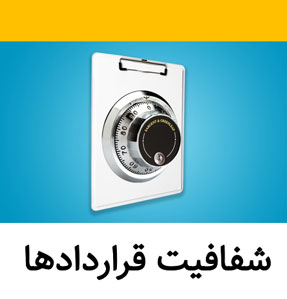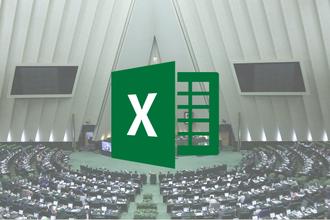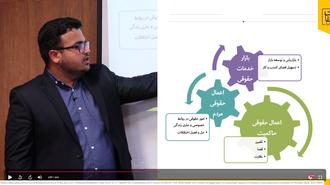در سال 2014، 8 قانون توسط کنگره و 12 قانون در دو مجلس نمایندگان و سنای آمریکا طرح شد که به نوعی به حوزه شفافیت مرتبط هستند. در ادامه لیستی از این قوانین به همراه توضیح مختصری پیرامون آنها ذکر میگردد.
| حوزه شفافیت | موضوعات عمومی | Cross Cutting Topics | Scope |
| موضوع | قانون، سند | Law, Document | Subject |
| جغرافیا | ایالات متحده | United States | Geography |
| نوع مطلب | متن | Text | Type |
| زبان | انگلیسی | English | Language |
| منتشر کننده | کنگره و مجلس نمایندگان آمریکا | US Senate & House | Publisher |
1. H.R.96-113 Cameras in the Courtroom Act
To permit the televising of Supreme Court proceedings.
Requires the Supreme Court to permit television coverage of all open sessions of the Supreme Court unless it decides by majority vote that allowing such coverage in a particular case would violate the due process rights of any of the parties involved.
2. hr760-113 Readable Legislation Act of 2013
Readable Legislation Act of 2013 - Prohibits an Act of Congress from being revised or amended by mere reference to it.
Requires every bill or joint resolution that amends an existing section, subsection, or other subdivision of any Act to set forth the section, subsection, or other subdivision sufficiently to enable the intent and effect of the legislation to be clearly understood. Requires proposed omissions and insertions to be shown by appropriate typographical devices.
3. hr917-113 Sunshine in the Courtroom Act of 2013
To provide for media coverage of Federal court proceedings.
4. hr1104-113 Federal Advisory Committee Act Amendments of 2013
Federal Advisory Committee Act Amendments of 2013 - Amends the Federal Advisory Committee Act (FACA) to require appointments to federal agency advisory committees to be made without regard to political affiliation or activity, unless otherwise required by federal statute. Directs the head of an agency, prior to appointing members to an advisory committee, to give interested persons an opportunity to suggest potential committee members.
Requires an individual appointed to an advisory committee who is not a full-time or permanent part-time officer or employee of the federal government to be designated as: (1) a special government employee if the individual is providing advice based on the individual's expertise or experience, or (2) a representative if the individual is representing the views of an entity outside of the federal government. Prohibits an agency from designating committee members as representatives to avoid subjecting them to federal ethics rules and requirements.
Requires each agency head to ensure that advice and recommendations of an advisory committee that reports to the agency are the result of the advisory committee's judgment, independent from the agency.
Provides that an individual who is not an officer or employee of the federal government shall be regarded as a member of an advisory committee if the individual regularly attends and participates in committee meetings as if the individual were a member, even if the individual does not have the right to vote or veto the advice or recommendations of the committee.
Requires each agency head to make available on the agency's Internet site specified information about each of the agency's advisory committees and their activities and to designate an Advisory Committee Management Officer to be responsible for the establishment, management, and supervision of the agency's advisory committees. Requires the Comptroller General to review compliance by agencies with FACA.
5. hr1133-113 Presidential Library Donation Reform Act of 2013
-
To amend title 44, United States Code, to require information on contributors to Presidential library fundraising organizations, and for other purposes.
Amends federal law regarding presidential archival depositories to require any presidential library fundraising organization to submit quarterly reports to the National Archives and Records Administration (National Archives) on every contributor who gave the organization a contribution or contributions (whether monetary or in-kind) totaling $200 or more for the quarterly period.
Requires the Archivist of the United States to publish such information on the website of the National Archives within 30 days after each quarterly filing.
Makes it unlawful for contributors or fundraising organizations to knowingly and willfully submit false information or omit material information. Prescribes criminal penalties for violation of such prohibitions.
6. hr1162-113 Government Accountability Office Improvement Act
Government Accountability Office Improvement Act - Authorizes the Comptroller General to: (1) obtain federal agency records required to discharge his or her duties (including audit, evaluation, and investigative duties), including through bringing civil actions under this Act, (2) make and retain copies of agency records, and (3) administer oaths when investigating fraud or federal employee misconduct.
States that no provision of the Social Security Act or the Federal Food, Drug, and Cosmetic Act shall be construed to limit, amend, or supersede the Comptroller General's authority to obtain any information, inspect, or copy any record under this Act.
Requires the Comptroller General to prescribe policies and procedures to protect from public disclosure proprietary or trade secret information obtained pursuant to the authority of the Government Accountability Office (GAO).
Declares that nothing in this Act shall be construed to: (1) alter or amend the prohibitions against the disclosure of trade secret or other sensitive information prohibited by federal and other applicable laws; or (2) affect the applicability of this Act, including the protections against unauthorized disclosure to obtained information.
Requires agency statements on actions taken or planned in response to Comptroller General recommendations to be submitted to the congressional committees with jurisdiction over the pertinent agency program or activity and to GAO.
7. hr1211-113 (Freedom of Information Act) FOIA Act
FOIA Oversight and Implementation Act of 2014 or the FOIA ACT - (Sec. 2) Amends the Freedom of Information Act (FOIA) to:
- require federal agencies to make disclosable public records available in an electronic, publicly accessible format;
- require the Office of Management and Budget (OMB) to ensure the existence and operation of a single, free website for submitting requests for records, receiving automated information about the status of a FOIA request, and filing appeals;
- prohibit an agency from withholding information under FOIA unless such agency reasonably foresees that disclosure would cause specific identifiable harm to an interest protected by an exemption under FOIA or if disclosure is prohibited by law (presumption of openess);
- expand the functions and reporting requirements of the Office of Government Information Services within the National Archives and Record Administration (NARA);
- require the Office of Government Information Services to offer mediation services to resolve disputes concerning the disclosure of information under FOIA;
- expand the rights of individuals making a FOIA request to appeal an adverse determination;
- require agencies to determine whether the release of agency records would contribute significantly to public understanding of the operations or activities of government;
- require agencies to document additional search or duplication fees;
- require agencies to submit annual FOIA reports to the Director of the Office of Government Information Services, in addition to the Attorney General;
- expand the duties of the Chief FOIA Officer of each agency to require an annual compliance review of FOIA requirements;
- establish the Chief FOIA Officers Council to develop recommendations for increasing compliance with FOIA requirements; and
- require each agency to update its FOIA regulations within 180 days of the enactment of this Act.
Requires the Director of the Office of Information Policy of the Department of Justice (DOJ) to submit biennial reports to the House Committee on Oversight and Government Reform and the Senate Committees on Homeland Security and Governmental Affairs and the Judiciary identifying categories of records that would be appropriate for proactive disclosure under FOIA.
(Sec. 3) Requires OMB to establish: (1) a three-year pilot program to review the benefits of a centralized portal to process requests and release information as required by FOIA, and (2) a plan to evaluate the functionality and benefits of such a portal to receive and track FOIA requests by selecting no fewer than three agencies that have not previously participated in such a portal.
Requires the head of each federal agency participating in the pilot program to: (1) report to Congress on the impact of the program on agency processes under FOIA and on whether the agency will continue to participate in the centralized portal, and (2) make such report available in an electronic, publicly accessible format.
(Sec. 4) Requires the Inspector General of each federal agency to: (1) periodically review compliance with FOIA disclosure requirements, including the timely processing of requests, the assessment of fees and fee waivers, and the use of disclosure exemptions; and (2) make recommendations to the head of an agency, including recommendations for disciplinary action. Makes the improper withholding of information under FOIA a basis for disciplinary action.
(Sec. 5) Directs the Archivist of the Untied States to establish an Open Government Advisory Committee as an independent advisory committee to make recommendations for improving government transparency.
(Sec. 6) Prohibits the authorization of additional funds to carry out the requirements of this Act.
8. hr1233-113 Presidential and Federal Records Act Amendments of 2013
-
To amend chapter 22 of title 44, United States Code, popularly known as the Presidential Records Act, to establish procedures for the consideration of claims of constitutionally based privilege against disclosure of Presidential records, and for other purposes.
Presidential and Federal Records Act Amendments of 2014 - (Sec. 2) Amends the Presidential Records Act to require the Archivist of the United States, upon determining to make publicly available any presidential record not previously made available, to: (1) promptly provide written notice of such determination to the former President during whose term of office the record was created, to the incumbent President, and to the public; and (2) make such record available to the public within 60 days, except any record with respect to which the Archivist receives notification from a former or incumbent President of a claim of constitutionally-based privilege against disclosure. Prohibits the Archivist from making a record that is subject to such a claim publicly available unless: (1) the incumbent President withdraws a decision upholding the claim, or (2) the Archivist is otherwise directed to do so by a final court order that is not subject to appeal.
Prohibits the Archivist from making available any original presidential records to anyone claiming access to them as a designated representative of a President or former President if that individual has been convicted of a crime relating to the review, retention, removal, or destruction of the records of the Archives.
Prohibits the President, the Vice President, or a covered employee (i.e., the immediate staff of the President and Vice President or office advising and assisting the President or Vice President) from creating or sending a presidential or vice presidential record using a non-official electronic messaging account unless the President, Vice President, or covered employee: (1) copies an official electronic messaging account of the President, Vice President, or covered employee in the original creation or transmission of the presidential or vice presidential record; or (2) forwards a complete copy of the presidential record to an official electronic messaging account of the President, Vice President, or covered employee not later than 20 days after the original creation or transmission of the presidential or vice presidential record.
(Sec. 3) Provides that the transfer to the Archivist of records by a federal agency that have historical significance shall take place as soon as practicable but not later than 30 years after the creation or receipt of such records by an agency. Expands the authority of the Archivist with respect to the creation and preservation of audio and visual records.
(Sec. 5) Revises the definition of "records" for purposes of this Act to include all recorded information, regardless of form or characteristics. Makes the Archivist's determination of whether recorded information is a record binding on all federal agencies.
(Sec. 6) Directs the Archivist to prescribe internal procedures to prevent the unauthorized removal of classified records from the National Archives and Records Administration (NARA) or the destruction or damage of such records, including when such records are accessed electronically. Requires such procedures to: (1) prohibit any person, other than personnel with appropriate security clearances (covered personnel), from viewing classified records in any room that is not secure, except in the presence of NARA personnel or under video surveillance, from being left alone with classified records unless under video surveillance, or from conducting any review of classified records while in the possession of any personal communication device; (2) require all persons seeking access to classified records to consent to a search of their belongings upon conclusion of their records review; and (3) require all writings prepared by persons, other than covered personnel, during the course of a review of classified records to be retained by NARA in a secure facility until such writings are determined to be unclassified, are declassified, or are securely transferred to another secure facility.
(Sec. 7) Repeals provisions authorizing the National Study Commission on Records and Documents of Federal Officials.
(Sec. 9) Transfers responsibility for records management from the Administrator of the General Services Administration (GSA) to the Archivist. Requires the transfer of records from federal agencies to the National Archives in digital or electronic form to the greatest extent possible.
(Sec. 10) Prohibits an officer or employee of an executive agency from creating or sending a record using a non-official electronic messaging account unless such officer or employee: (1) copies an official electronic messaging account of the officer or employee in the original creation or transmission of the record, or (2) forwards a complete copy of the record to an official electronic messaging account of the officer or employee not later than 20 days after the original creation or transmission of the record. Provides for disciplinary action against an agency officer or employee for an intentional violation of such prohibition.
9. hr1380-113 Access to Congressionally Mandated Reports Act
-
To require the Public Printer to establish and maintain a website accessible to the public that allows the public to obtain electronic copies of all congressionally mandated reports in one place, and for other purposes.
Access to Congressionally Mandated Reports Act - Requires the Public Printer to establish and maintain a website accessible by the public for obtaining electronic copies of all congressionally mandated reports in one place.
Requires each federal agency to provide the Public Printer with electronic copies of its congressionally mandated reports for publication on the website. Prohibits an agency head from changing or removing a report published on the website, except for technical changes, without the express, written consent of the chairman of each congressional committee to which the report is submitted.
Exempts information or records that are exempt from public disclosure under the Freedom of Information Act (FOIA) from publication on the website. Requires each agency head to redact from congressionally mandated reports any information that may not be publicly released under FOIA before submission for publication on the website.
10. hr2061-113 Digital Accountability and Transparency Act (DATA) Act
The DATA Act would require the Treasury Department to create government-wide data standards for agency financial reports, payments, budget actions, contract reporting, and grant reporting, direct agencies to use those data standards, and mandate that information be published online. Once it is fully implemented, the DATA Act will be the most significant federal transparency reform since President Johnson signed the Freedom of Information Act in 1967. This comprehensive House bill contains an accountability platform that was removed from the Senate's companion legislation S. 994. The provision would expand the mandate of the Recovery Accountability and Transparency Board's Recovery Operations Center, which used open data analytics to eliminate potential waste and fraud in stimulus spending, to cover all federal disbursements rather than just stimulus grants and contracts. --- summary from the Data Transparency Coalition (http://datacoalition.blogspot.com/2013/11/data-act-passes-us-house.html)
11. hr2440-113 FISA Court in the Sunshine Act of 2013
FISA Court in the Sunshine Act of 2013 - Expresses the sense of Congress that each decision, order, or opinion ("decision," for purposes of this Act) issued by the Foreign Intelligence Surveillance Court or the Foreign Intelligence Surveillance Court of Review that includes significant construction or interpretation of Foreign Intelligence Surveillance Act of 1978 (FISA) provisions concerning access to business records and the targeting of persons reasonably believed to be located outside the United States to acquire foreign intelligence information should be declassified in a manner consistent with the protection of national security, intelligence sources and methods, and other properly classified and sensitive information.
Amends FISA provisions concerning access to business records and the targeting of persons reasonably believed to be located outside the United States to require the Attorney General, with exceptions, to declassify and make publicly available decisions concerning certain surveillance orders required for inclusion in a semiannual report to Congress. Requires release to the public of unclassified summaries and reports if the Attorney General determines that a decision may not be declassified.
Requires the Attorney General, in cases in which an unclassified summary may not be made available, to make publicly available an unclassified report on the status of the internal deliberations and process regarding the declassification by executive branch personnel of such decisions, including estimates of the number of decisions that will be declassified or remain classified.
12. hr2475-113 Ending Secret Law Act
Ending Secret Law Act - Expresses the sense of Congress that each decision, order, or opinion ("decision," for purposes of this Act) issued by the Foreign Intelligence Surveillance Court or the Foreign Intelligence Surveillance Court of Review that includes significant construction or interpretation of Foreign Intelligence Surveillance Act of 1978 (FISA) provisions concerning access to business records and the targeting of persons reasonably believed to be located outside the United States to acquire foreign intelligence information should be declassified in a manner consistent with the protection of national security, intelligence sources and methods, and other properly classified and sensitive information.
Amends FISA provisions concerning access to business records and the targeting of persons reasonably believed to be located outside the United States to require the Attorney General, with exceptions, to declassify and make publicly available decisions concerning certain surveillance orders required for inclusion in a semiannual report to Congress. Requires release to the public of unclassified summaries and reports if the Attorney General determines that a decision may not be declassified.
Requires the Attorney General, in cases in which an unclassified summary may not be made available, to make publicly available an unclassified report on the status of the internal deliberations and process regarding the declassification by executive branch personnel of such decisions, including estimates of the number of decisions that will be declassified or remain classified.
13. s375-113 Senate Campaign Disclosure Parity Act
Senate Campaign Disclosure Parity Act - Amends the Federal Election Campaign Act of 1971 to require all election-related designations, statements, and reports required to be filed under the Act to be filed directly with the Federal Election Commission (FEC).
14. s405-113 Sunshine in the Courtroom Act of 2013
15. s549-113 Public Online Information Act of 2013
16. s994-113 Digital Accountability and Transparency Act (DATA)
17. s1130-113 Ending Secret Law Act
18. s1207-113 Cameras in the Courtroom Act
19. s1467-113 FISA Court Reform Act of 2013
20. s1665-113 Read the Bills Act
Read the Bills Act - Requires any bill or resolution introduced in either chamber of Congress to contain a provision citing the specific powers granted to Congress in the Constitution to enact the proposed measure, including all of its provisions.
Requires any measure introduced in either chamber, intended to amend or modify the effect of, or which would have such an effect, any current provision of law, including its expiration date, to set forth: (1) the current version of the entire section of the current law that the measure proposes to amend, verbatim; (2) the amendments being proposed by the measure; and (3) the section of law as it would read as modified by such amendments. Excludes measures which would strike the text of an entire section of a law.
Prohibits the Clerk of the House of Representatives or the Secretary of the Senate from accepting legislation if it is noncompliant with these requirements.
Applies such requirements to any legislation presented for consideration on the floor of either chamber.
Prohibits any noncompliant measure from being submitted for a vote on final passage.
Prohibits either chamber or Congress jointly from waiving or modifying these requirements.
Bars a vote on final passage of a measure (except private bills) from occurring in either chamber, unless: (1) the full text of the measure is published at least seven days before the vote on an official website of each chamber, (2) public notice of the specific calendar week during which the vote is scheduled to take place is posted on the respective website within six days before the Monday of such week, and (3) there is a reading of its full text verbatim by the Clerk or the Secretary to the respective chamber.
Requires a Member of Congress, before voting in favor of final passage of any measure (except a private bill) to sign an affidavit, executed under penalty of perjury, that the Member either: (1) was present throughout the entire reading of each such measure, and listened attentively to such reading in its entirety; or (2) before such vote, read attentively each such measure in its entirety.
Prohibits either chamber or Congress jointly from waiving or modifying this requirement.
Declares that an Act of Congress noncompliant with this Act shall have no force or effect. Bars any legal, equitable, regulatory, civil, or criminal action from being brought under such Act.
Grants the following aggrieved individuals the right to bring an action against the United States to seek appropriate relief, including an injunction against the enforcement of any law, the passage of which did not conform to this Act: (1) persons aggrieved by an action of any executive officer or employee, (2) Members of Congress, and (3) persons individually aggrieved by the failure of his or her Senator or Member of the House of Representatives to fulfill their obligation under this Act.
پی نوشت:
لیست این قوانین به همت مؤسس سایت Govtrack و از این آدرس بدست آمده است.







